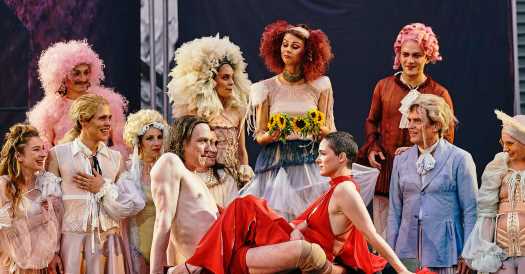
After a Winter of Discontent, a Glorious Summer in Salzburg
07/29/2021SALZBURG, Austria — “Now is the winter of our discontent/Made glorious summer by this sun of York.” Those lines, perhaps the most famous opening in all of English drama, go unspoken in the Salzburg Festival’s new production “Richard the Kid and the King,” a cradle-to-grave chronicle of the Bard’s most ruthless monarch. Yet the monologue was ringing in my ears as I left the theater after four hours of greed, betrayal, hypocrisy, infanticide, decapitation and disembowelment.
As Salzburg warmed up in late July, the arrival of “Richard” was an electrifying theatrical jolt to jump-start the event’s second pandemic-era installment, which features four new dramatic productions, six fully staged operas and scores of concerts. Forsooth, the winter of our discontent has been made glorious summer by the Salzburg Festival.
The acclaimed German theatermaker Karin Henkel was originally onboard to direct “Richard III” in 2020. Postponed a year by the coronavirus pandemic, the production has been enlarged and expanded for this year’s edition. Henkel and her creative team have incorporated portions from “Slaughter!,” a 12-hour compression of Shakespeare’s eight War of the Roses plays that was first performed in Salzburg in 1999.
In the evening’s first half, “Richard the Kid,” which largely deals with the adolescent sons of York, the production uses the “Slaughter!” mix of German and profanity-laden English gangster slang.
Much of the colorful patois is rendered with vulgar hilarity by Kate Strong, a British actress and dancer who has been a fixture in German-language theater for the past 25 years. She is one of only four actors onstage before intermission, who divide nine roles among themselves. The heroic Bettina Stucky (as Clarence and Elizabeth) and the fearless Kristof Van Boven (as the entire house of Lancaster) show similar nimble dexterity in bringing this most dysfunctional and tragic of royal families to life.
Even if the show’s busier and more populous second half, “Richard the King,” is less riveting than the beginning, the glue that holds the grim production together is Lina Beckmann’s astounding performance as Richard. It is as much an interpretation of the charming psychopath as it is a treatise on the nature of acting itself, as Beckmann slips into Richard’s misshapen body and mind, allowing us to watch with uncanny intimacy the dissembling, scheming and feral ambition that animate the arch-villain.
Witnessing Beckmann’s brazen performance put me in mind of another captivating Richard III of recent memory: Lars Eidinger.
In 2015, the prolific Berlin-born stage and screen actor — best known internationally for his role in the hit TV series “Babylon Berlin” — first performed the conscienceless king at the Berlin Schaubühne, where he has worked since 1999. Thomas Ostermeier’s shattering production, which bored inside the murderous monarch’s blood-soaked brain with upsetting perversity, has been performed everywhere from Avignon, France, to Adelaide, Australia, and came to New York in 2017.
Now Eidinger, 45, has become the latest in a long line of German and Austrian acting greats to tackle the main role in “Jedermann,” Hugo von Hofmannsthal’s 1911 version of a medieval morality play that is the festival’s oldest tradition and possibly its strangest.
In August 1920, the first Salzburg Festival opened with an outdoor performance of this “Play About the Death of the Rich Man” in a production by Max Reinhardt, who, along with Hofmannsthal, was one of the event’s founders. It has been performed almost every summer since, with the likes of Maximilian Schell, Klaus Maria Brandauer and, most recently, Tobias Moretti in the title role of a hedonistic rich man visited by death, who offers his victim a last shot at salvation.
The local enthusiasm for the play is difficult to explain to outsiders. To say that “Jedermann” lacks the popular appeal of “The Sound of Music,” another famous Salzburg cultural export, is putting it mildly.
For a tradition as deeply entrenched as “Jedermann,” productions here tend to be, well, traditional. Given this fact, the new production, by the director Michael Sturminger, is practically avant-garde, or at least tries to be: There is a largely abstract set and eclectic costumes, comic-surreal moments, including an expertly choreographed boxing match, and interpolated texts and songs. But the production fails to establish a consistent tone, and Sturminger’s varied theatrical effects are ill suited to Hofmannsthal’s lofty and archaic rhyming couplets.
I don’t mean to suggest that a ritualized parable like “Jedermann” resists daring approaches, just that many of this production’s ideas seem tentative or not fully thought through.
Eidinger approaches the lengthy role with focused sobriety that seemed intended to invest the character with unexpected psychological shadings, but the performance seemed to ignore, rather than engage with, the inherent naïveté of Hofmannsthal’s text and the archetypical nature of its protagonist. (It seems misguided to treat Jedermann as a character as richly drawn as Richard III or Hamlet.)
The “Jedermann” premiere was supposed to take place outside, but persistent rain forced the show indoors, to the Grosses Festspielhaus, the festival’s largest opera house, which is where I saw the third of 14 planned performances. That cavernous venue seemed to have something to do with the loss of up-close-and-personal immediacy: I found myself wondering how different my experience of the show would have been from the stadium-style bleachers set up on Cathedral Square, watching the performers strut and fret their hour on a stage whose vastness did not threaten to dwarf them.
Eidinger is a distinctive actor whose ferocity and intensity come through in performances that are as grippingly psychological as they are dazzlingly physical. His pugilistic and choreographic feats notwithstanding, much of his Jedermann had a note of studied, at times ironic, understatement. From my seat in Row 15, 100 or so feet from the stage, I felt that the subtlety of his performance failed to transmit.
Initially, Salzburg Festival organizers said they would leave it up to the audience whether to wear masks during the performances, as was the policy last year, during the festival’s socially distanced installment. Last year, the festival venues were filled at half capacity. In 2021, I sat elbow to elbow with my fellow theatergoers.
But after one of the 2,179 audience members who had attended the “Jedermann” premiere tested positive for the coronavirus, the organizers reversed course and mandated face coverings for all indoor performances. (My impression from the opening week is that festivalgoers are mostly complying, although I’ve seen unusual ways to wear a mask: A bald man sitting in front of me at “Richard” wore his mask on his head like a birthday hat.)
The “Jedermann” infection, and the festival’s swift response, was a sobering reminder for Salzburg, which has now successfully opened not one but two pandemic-era installments against staggering odds, of the health emergency that continues to ravage the world outside this sheltered oasis in the Alps.
The Salzburg Festival continues through Aug. 30.
Source: Read Full Article

